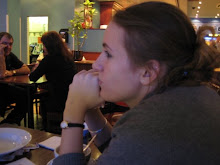There are men I wish I could meet. Men who come across, in the pages of the books wherein I've glimpsed them, as wise, and compassionate, and humble -- with twinkles lodged deep in their eyes. Sometimes I wonder if I was just born too late, here "at the end of all things" -- the world has grown old with television and cell phones and internet, and the Chestertons, Lewises, and MacDonalds have moved on to better realms.*
But tonight I met Bishop Kallistos Ware, and listening to the tenure of his voice in the gilded upper room used by the Oxford C.S. Lewis Society, I was reminded that maybe not all of the giants have passed.
He spoke with handwritten notes he barely used, each phrase richly textured with scores of books read and thoughts ruminated. He made us laugh. He made us think. He gave us hope.
He talked of listening to Lewis debate at the Socratic Society during his [Kallistos's] years as an undergraduate. Described him as a great thinker, and a great arguer, fast on his toes with his thoughts.
The topic was heaven and hell -- much of it grappling with ideas I wrote my "C.S. Lewis and the Bible" paper on in college. That we are saved by God's grace, grace that gives us the ability to choose, even if our choice is a hell locked from the inside -- a hell filled still with the love of God, and obstinate rejection of that love.
We talked about animals, and how, while not immortal in themselves, our interaction with them -- knowing them, loving them -- may make them, in Lewis's mind anyway, eternal beings. As Kallistos said, "We cannot know, but we can hope."
It was a phrase he repeated a lot. A phrase he used when he said that believing that all must be saved is contrary to the freedom of a loving God, but still we can hope, while we cannot know, that all will be saved.
And, in phrases that resonated with Lewis and Tolkien's visions of fairy-stories and fantasy, when asked about learning from other religions, he answered that journeys are about coming home with new eyes. In the same way, religious dialog is valuable (and beautiful) in that it helps us see new truth within our own tradition -- and exposes us to new ways of approaching the Divine through prayer.
And apparently heaven (Lewis would be happy to know) will be like the Oxford University Walking Club -- or Felix the Cat who kept walking on ("further up, and further in").
And now it is midnight, and crew training, last minute reading, and Old Norse tutorials await me in the morning. So to bed I must go.
*I will admit that this passion for dead white men is problematic on many levels. But God gives grace even to them, and their words and worlds resonate deep within my soul, calling me home to lost visions.
Practices for Disturbing Times
5 years ago

5 comments:
Is this the same Ware that Wrote The Orthodox Way?
Yep, yep.
I believe that Abuna Chacour and Jean Zaru (a woman) and many others I have met in Palestine would say that we should treat all people alike, as human beings born in the image of God. Even white men (dead or alive). I have a personal stake in the matter, I must admit :-), and I do understand the need to compensate for the imbalances of history. All to say, I appreciate your appreciation of Lewis and others' works.
And I believe it would be the "tenor" of his voice? :-)
I like the comment, too, about hoping that all will be saved. Any human being who experiences something positive and lifechanging should share that with others, not in a negative way ("if you don't enter into my experience, you are damned") but in a positive way ("I have experienced something of God's salvation, and hope for you to, too"), while respecting the will and choice of each person, and the fact that we are not their judge, but their fellow pilgrim.
Yes, well, spelling is still not my strong suit. :)
And he actually said something very similar, when asked where mission comes in if people can be saved without direct knowledge of Christ (the assumption you have to make, it seems, if you believe that hell is a choice to reject God -- never ignorance of God). That Christ is to be shared because of our joy, not our fear.
Post a Comment